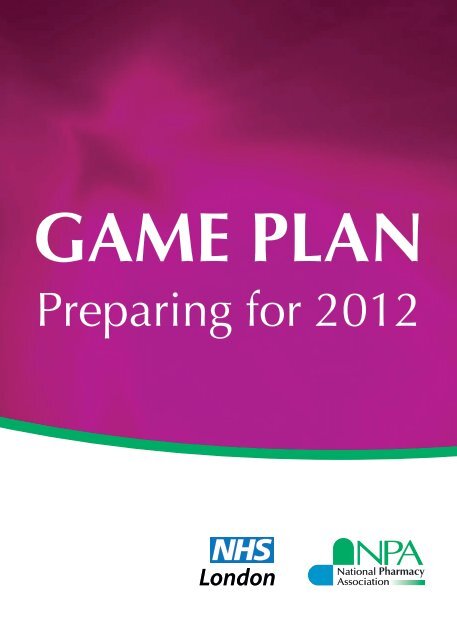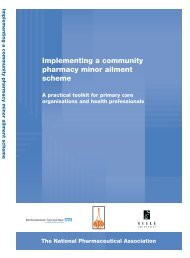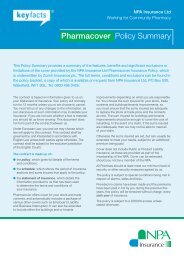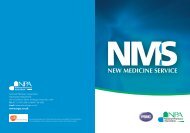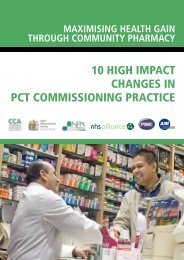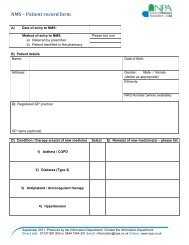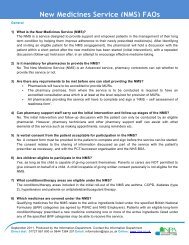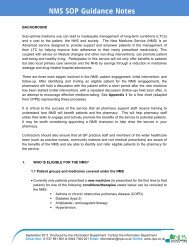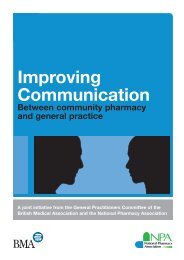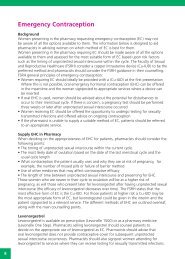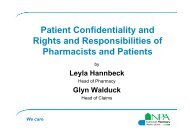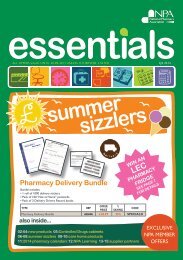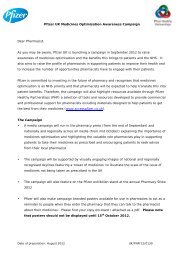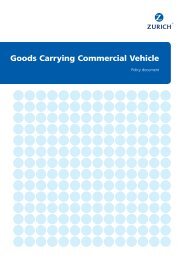NPA Game Plan - National pharmacy association
NPA Game Plan - National pharmacy association
NPA Game Plan - National pharmacy association
Create successful ePaper yourself
Turn your PDF publications into a flip-book with our unique Google optimized e-Paper software.
GAME PLAN<br />
Preparing for 2012<br />
London
Contents<br />
Foreword 3<br />
London 2012 4<br />
Olympic and Paralympic <strong>Game</strong>s<br />
Hints & Tips: Pharmacy Services<br />
during the <strong>Game</strong>s<br />
Emergency Contraception 8<br />
EEA and Swiss Prescriptions 11<br />
Legal Requirements<br />
EEA and Swiss Prescriptions 13<br />
Practical Advice<br />
Emergency Supplies 15<br />
Drugs in Sport 17<br />
Identifying UK Equivalents 18<br />
of Foreign Medicines<br />
First Aid for Pharmacists 24<br />
This pack also includes:<br />
Anti-doping advice cards<br />
NHS London posters<br />
NHS London leaflets<br />
Disclaimer<br />
Every care has been taken to ensure<br />
the accuracy of the guidance in this<br />
document, however, no responsibility will<br />
be accepted for any errors or omissions,<br />
or any consequences due to these.
Foreword<br />
This summer is likely to be one of the busiest for<br />
Community Pharmacy Teams across London and<br />
other Olympic sites in recent history as our own<br />
country plays host to the Olympic and<br />
Paralympic <strong>Game</strong>s.<br />
The logistics of organising such events are enormous,<br />
and the impact it has on you and your team to deliver<br />
healthcare to our patients may seem challenging.<br />
To help you continue to deliver high quality<br />
healthcare, the <strong>NPA</strong> has produced this resource for<br />
members with the assistance of NHS London and<br />
Reckitt Benckiser.<br />
The games present a wonderful opportunity for us<br />
to showcase to visitors from around the world the<br />
high level of care we deliver everyday for people<br />
in our community.<br />
Michael Holden FRPharmS<br />
<strong>NPA</strong> Chief Executive<br />
Our Information Department is available for members to contact via information@npa.co.uk,<br />
or by calling 01727 891 800, and more information is available online www.npa.co.uk.<br />
3
4<br />
London 2012 Olympic and Paralympic <strong>Game</strong>s<br />
Hints & Tips: Pharmacy Services during the <strong>Game</strong>s<br />
Opening hours<br />
There are opportunities for pharmacies to temporarily open for extended (supplementary)<br />
hours during the Olympic and Paralympic <strong>Game</strong>s to meet any anticipated increase in local<br />
demand. Pharmacies must liaise with their Primary Care Trust (PCT) and ideally provide 90<br />
days notice of any intended change. Pharmacies who are thinking of extending their hours<br />
during the <strong>Game</strong>s, but who have missed the 90 day notice period are advised to discuss<br />
their requirements directly with the PCT who may agree the change with a shorter notice<br />
period. The NHS would encourage increased opening hours, however not at the expense<br />
of reduced hours elswhere. It is essential that Pharmacies inform their PCTs of ANY changes<br />
to opening hours. Further information on amending opening hours can be found on the<br />
Pharmaceuticals Services Negotiating Committee (PSNC) website: www.psnc.org.uk/pages/<br />
opening_hours.html#requirements.<br />
Pharmacies are required to clearly display their opening hours and to signpost patients to<br />
alternative pharmaceutical services when the <strong>pharmacy</strong> is closed.<br />
Details of <strong>pharmacy</strong> opening hours and services should be up-to-date on the NHS Choices<br />
website, as well as any other web-presence the <strong>pharmacy</strong> may have. NHS Choices is being<br />
promoted as the first-line source of information for overseas travellers visiting the <strong>Game</strong>s.<br />
Practice leaflets should be current and pharmacies should have an ample supply available.<br />
Business continuity<br />
Staff should familiarise themselves with the NHS London ‘Olympic guide for Community<br />
Pharmacy’ and the ‘Developing resilient organisations.’ Pharmacies are encouraged to return<br />
their business continuity forms to PCTs as soon as possible.<br />
Assurance<br />
Pharmacies are required to provide assurance of their <strong>Game</strong>s readiness to their local PCT. If<br />
you have not already done so please ensure you do this.<br />
Signposting<br />
Check with the local GP/dental practices to see if their opening hours are varying at all<br />
during the <strong>Game</strong>s to meet expected demand. Find out where the nearest NHS walkin<br />
centre or urgent care centre is and ensure all staff are able to direct visitors to these<br />
resources if necessary. Ensure all <strong>pharmacy</strong> services are clearly promoted.<br />
Repeat prescription services<br />
Pharmacies should encourage patients to request repeat prescriptions well in<br />
advance and not leave it until the last minute. Ideally these should be dispensed<br />
before the <strong>Game</strong>s commence to avoid patients being caught in travel delays<br />
and delivery disruptions. It is a good idea to advise patients in advance of<br />
<strong>pharmacy</strong> opening hours over these periods.<br />
Consider arranging a meeting with the local surgery practice managers as<br />
well as the managers of any local care homes, Drug Action Teams etc. to discuss<br />
the impact the <strong>Game</strong>s may have on <strong>pharmacy</strong> services and to agree strategies to<br />
minimise any problems (e.g.issue prescriptions in advance, multiple prescriptions<br />
for smaller quantities, encourage use of the NHS repeat dispensing scheme).
NHS repeat dispensing scheme (RA/RD forms)<br />
Patients may request more than one Repeat Dispensing (RD) batch prescription to ensure<br />
they do not run out of their medicines during the <strong>Game</strong>s period. Pharmacists faced with<br />
such requests will need to consider whether such a supply is appropriate and in-line with<br />
the NHS <strong>pharmacy</strong> contract. Routine requests for more than one RD should NOT normally<br />
be carried out, but may be considered in exceptional circumstances. It is good practice to<br />
notify the prescriber before supplying more than one RD.<br />
Before making a supply, the pharmacist will need to consider:<br />
• Whether a dispensing interval is stated, as this MUST be adhered to<br />
• The NHS Terms of Service checks on whether the patient is experiencing side-effects,<br />
for example, should be carried out for each dispensing of an RD<br />
• If a patient requests multiple RDs it may be preferable to refer them to their prescriber<br />
for a single prescription form.<br />
Instalment prescriptions<br />
Incorrectly written controlled drug (CD) instalment prescriptions often affect the smooth<br />
provision of services for patients. Pharmacists need to rigorously check these prescriptions as<br />
soon as they are received to ensure that they are valid. Any queries can then be addressed<br />
prior to surgeries and clinics closing at weekends for example.<br />
Stock<br />
Confirm order cut-off times and delivery dates with wholesalers in advance because most<br />
manufacturers and distributors are anticipating travel disruptions during the <strong>Game</strong>s period.<br />
Advise patients that there may be a delay in receiving their drugs, especially with any<br />
“special” items ordered over this period. It is important that the response to the challenges<br />
and opportunities posed by the London 2012 <strong>Game</strong>s is proportionate. Pharmacists should<br />
look at the likely local impact of the <strong>Game</strong>s on supply and demand and plan accordingly.<br />
All pharmacies should plan early with your suppliers to ensure you are prepared. Those<br />
pharmacies that are near to the Olympic and Paralympic Road networks, transport hotspots,<br />
central and east London or near other <strong>Game</strong>s-related venues and events, may need to do<br />
more detailed contingency planning than those which are not.<br />
Pharmacies may also wish to ensure that there is sufficient stock of fast-moving lines.<br />
Avoid over-ordering as this will increase the risk of shortages.<br />
Consider increasing stock levels of ‘summer essentials’ to take advantage of the increased<br />
footfall from visitors to the <strong>Game</strong>s, for example:<br />
• Basic over-the-counter (OTC) remedies such as painkillers, diarrhoea and vomiting<br />
treatments, antihistamines and bite-relief remedies<br />
• Emergency hormonal contraception<br />
• Plasters and small packs of tissues<br />
• Foot care (for example cooling sprays, blister plasters, protective pads, etc)<br />
• Alcohol-based hand gels<br />
• Sun protection creams SPF 15 and above (the Olympic and Paralympic venues restrict<br />
liquid containers to a maximum of 100ml)<br />
• Condoms.<br />
5
6<br />
Emergency supplies<br />
Pharmacists should consider the circumstances of each individual request for an emergency supply<br />
and use their professional discretion to determine if an emergency supply would be appropriate.<br />
Where an emergency supply for a patient is refused then the patient should be signposted to<br />
alternative healthcare services and the reasons for refusal documented. Comprehensive guidance<br />
on emergency supplies of prescription-only medicines, including handling requests from European<br />
Economic Area (EEA) and Swiss patients, can be found later in this booklet.<br />
Prescriptions from overseas doctors<br />
Guidance on prescriptions issued by doctors in EEA countries or Switzerland is available<br />
later in this booklet. Prescriptions from practitioners registered in countries outside the EEA<br />
or Switzerland may not be dispensed UNLESS the doctor has registered with the General<br />
Medical Council (GMC) at www.gmc-uk.org. Doctors who are visiting the UK as part of the<br />
medical team supporting athletes competing in the Olympic and Paralympic <strong>Game</strong>s will be<br />
able to temporarily register with the General Medical Council. The doctor’s record on the<br />
GMC website will be annotated to show this restriction.<br />
Athletes<br />
Athletes competing in London 2012 Olympic and Paralympic <strong>Game</strong>s will be expected to<br />
obtain their medical supplies through the <strong>Game</strong>s Polyclinic Pharmacies in the Athletes<br />
Village. In addition to the three Athlete Village pharmacies, which will supply medicines to<br />
athletes and officials, there will be 2 retail pharmacies in the spectator areas of the Stratford<br />
Olympic Park – one in the North of the Park near the Basketball Arena and one in the South<br />
near the Orbit sculpture. These will provide spectators with a range of <strong>pharmacy</strong> medicines<br />
for minor conditions. A further retail <strong>pharmacy</strong> will also operate in the Olympic Press and<br />
Broadcast Centre, for the 27,000 members of the media that will inhabit this facility.<br />
Pharmacists working outside the <strong>Game</strong>s venues, who are asked to supply prescribed or OTC<br />
medicines for competing athletes at the <strong>Game</strong>s, should follow the London 2012 Organising<br />
Committee (LOCOG) guidance.<br />
An Anti-Doping advice card aimed at elite and high performance athletes as well as coaches<br />
and athlete support personnel can be downloaded from the UK Anti-Doping website:<br />
www.ukad.org.uk/resources/document/advice-card (A copy is enclosed in this <strong>NPA</strong> Olympic<br />
support pack).<br />
NHS prescriptions for overseas visitors<br />
If the doctor has chosen to issue an NHS prescription for an overseas visitor then the standard<br />
NHS exemptions would apply as they would for UK residents. If the patient does not fall<br />
under any of the exemption categories and believes they should not pay a prescription<br />
charge they should be charged and issued with an NHS receipt (FP57) at the time of supply<br />
and be advised to try to claim the fees back when back in their home country (either from<br />
their insurance company or their health service equivalent).Guidance on NHS services and<br />
charges for overseas visitors can be found on the Department of Health website:<br />
www.dh.gov.uk/en/Healthcare/Entitlementsandcharges/OverseasVisitors/index.htm.<br />
PGDs for overseas travellers<br />
Visitors from overseas are eligible for private <strong>pharmacy</strong> Patient Group Direction (PGD)<br />
services provided they meet the service specification criteria and are able to fulfil the<br />
consent criteria. Pharmacists should check with their PCT with regards to NHS PGDs.
Training – <strong>pharmacy</strong> and sports<br />
The Centre for Pharmacy Post-Graduate Education (CPPE) has developed a series of<br />
e-learning programmes that cover the role <strong>pharmacy</strong> plays in sports and fitness including:<br />
• Doping and anti-doping in sport<br />
• Medical services at international sporting events: a healthcare professional’s perspective<br />
• Pharmacy services and support in sport and fitness<br />
• Overview of the substances and methods in the Prohibited List (further information can<br />
be found on the CPPE website: www.cppe.ac.uk).<br />
Managing prescription owings and unobtainable items<br />
If the <strong>pharmacy</strong> does not have sufficient stock to supply a patient’s prescribed item, the<br />
pharmacist should consider the risk(s) to the patient of not receiving the medicine.<br />
Where patients are being treated for acute or serious conditions (such as mental health<br />
problems like schizophrenia or bipolar disorder) or where dosing of the medicine is critical<br />
or requires frequent monitoring (e.g. warfarin or ciclosporin) the risk(s) for the patient may<br />
be high and in these circumstances it is good practice to inform the prescriber that the<br />
medicine could not be dispensed.<br />
<strong>NPA</strong> services<br />
• <strong>NPA</strong> Information Department telephone service: available Monday-Friday 9-6pm,<br />
Saturday 9-1pm. Email: information@npa.co.uk<br />
• <strong>NPA</strong> Information Services Database (IRIS): available to <strong>NPA</strong> members 24/7<br />
at www.npa.co.uk<br />
• <strong>NPA</strong> Sales. To ensure the <strong>pharmacy</strong> does not run out of essential <strong>pharmacy</strong> items during<br />
the <strong>Game</strong>s, it is recommended pharmacies:<br />
- Identifying opportunities for night time or alternative address deliveries<br />
- Identifying which products are critical to the business<br />
- Building stock before the <strong>Game</strong>s to avoid being without key items<br />
- Ordering as early in the day as possible and ideally before 4pm<br />
<strong>NPA</strong> DX prescription courier service may be affected. Please contact <strong>NPA</strong> Sales on 0844 736<br />
4199 to discuss individual options (e.g. night-time deliveries, alternative delivery address).<br />
Useful links<br />
• NHS London: guidance for community <strong>pharmacy</strong>-planning for the London 2012<br />
Olympic and Paralympic <strong>Game</strong>s<br />
www.london.nhs.uk/getting-fit-for-the-2012-games/key-documents/guidance-for-<br />
community-pharmacists<br />
• Ask Your Pharmacist (advice to foreign visitors)<br />
www.askyourpharmacist<br />
• London 2012<br />
www.london2012.com<br />
• Transport for London, London 2012 <strong>Game</strong>s<br />
www.tfl.gov.uk/gettingaround/london2012/21677.aspx<br />
• World Anti-Doping Agency Prohibited List of Substances and Methods in sport<br />
http://list.wada-ama.org<br />
• Global Dro online resource for checking prohibited and restricted drugs in sport<br />
www.globaldro.com<br />
• UK Anti-Doping anti-doping advice card for competing athletes:<br />
www.ukad.org.uk/resources/document/advice-card<br />
• NHS Choices<br />
www.nhs.uk/Pages/HomePage.aspx<br />
7
8<br />
Emergency Contraception<br />
Background<br />
Women presenting in the <strong>pharmacy</strong> requesting emergency contraception (EC) may not<br />
be aware of all the options available to them. The information below is designed to aid<br />
pharmacists in advising women on which method of EC is best for them.<br />
Women presenting in the <strong>pharmacy</strong> requiring EC should be made aware of all the options<br />
available to them and assessed for the most suitable form of EC based upon risk factors<br />
such as the timing of unprotected sexual intercourse within the cycle. The Faculty of Sexual<br />
and Reproductive Healthcare (FSRH) consider a copper intrauterine device (Cu-IUD) to be the<br />
preferred method and pharmacists should consider the FSRH guidance in their counselling.<br />
FSRH general principles of emergency contraception:<br />
• Women requiring EC should ideally be provided with a (Cu-IUD) at the first presentation<br />
Where this is not possible, oral emergency hormonal contraception (EHC) can be offered<br />
in the meantime and the woman signposted to appropriate services where a device can<br />
be inserted<br />
• If oral EHC is used, women should be advised about the potential for disturbances to<br />
occur to their menstrual cycle. If there is concern, a pregnancy test should be performed<br />
three weeks or later after unprotected sexual intercourse occurred<br />
• Women receiving EC should be offered the opportunity to undergo testing for sexually<br />
transmitted infections and offered advice on ongoing contraception<br />
• If the pharmacist is unable to supply a suitable method of EC, patients should be referred<br />
to an appropriate service.<br />
Supply EHC in Pharmacy<br />
When deciding on the appropriateness of EHC for patients, pharmacists should consider the<br />
following points:<br />
• The timing of unprotected sexual intercourse within the current cycle.<br />
• The most likely date of ovulation based on the date of the last menstrual cycle and the<br />
usual cycle length<br />
• What contraception the patient usually uses and why they are at risk of pregnancy, for<br />
example, the number of missed pills or failure of barrier method<br />
• Use of other medicines that may affect contraceptive efficacy<br />
• The length of time between unprotected sexual intercourse and presenting for EHC.<br />
Those women who are nearer in their cycle to ovulation will be at a higher risk of<br />
pregnancy, as will those who present later for levonorgestrel after having unprotected sexual<br />
intercourse (the efficacy of levonorgestrel decreases over time). The FSRH states that the<br />
most effective form of EC is the Cu-IUD. For those patients at higher risk a Cu-IUD may be<br />
the most appropriate form of EC, but levonorgestrel could be given in the interim and the<br />
patient signposted to a relevant service. The different methods of EHC are outlined overleaf,<br />
along with the main counselling points.<br />
Levonorgestrel<br />
Levonorgestrel is available on prescription (Levonelle 1500) or as a <strong>pharmacy</strong> medicine<br />
(Levonelle One Step). Pharmacists selling levonorgestrel should counsel patients to<br />
decide on the appropriate use of levonorgestrel as EC. Pharmacists should advise that<br />
oral levonorgestrel does not provide contraceptive cover for subsequent unprotected<br />
sexual intercourse occurrences. Pharmacists should also signpost women attending for<br />
levonorgestrel to services where they can receive testing for sexually transmitted infections.
Women who are considered to be more at risk of pregnancy, as detailed previously, should<br />
be advised that the Cu-IUD is the preferred method in this situation. Although it is possible<br />
to supply levonorgestrel, women should be advised that the Cu-IUD is more effective and<br />
referred to a service where one can be inserted.<br />
For women who have taken levonorgestrel and are continuing to use a hormonal method of<br />
contraception, they should be advised to use additional contraceptive methods for:<br />
• Most hormonal contraception–7 days<br />
• Progestrogen-only pill–2 days<br />
• Qlaira–9 days.<br />
If a woman who has taken levonorgestrel vomits within two hours of taking it, they should<br />
be offered a repeat dose or be referred for a Cu-IUD, the FSRH recommends.<br />
The summaries of product characteristics for levonorgestrel products state that if patients<br />
vomit within three hours, additional EC should be used. Levonorgestrel can be taken more<br />
than once in a cycle, according to the FSRH. The summary of product characteristics for<br />
levonorgestrel products state that repeated administration is not advisable because it may<br />
disrupt the menstrual cycle.<br />
Ulipristal acetate<br />
Ulipristal acetate (EllaOne) is available as a prescription-only medicine. Pharmacists should<br />
consider the following points when dispensing the product. Women continuing to use a<br />
hormonal contraceptive method should be advised to use additional contraception for the<br />
following:<br />
• Most hormonal contraception–14 days<br />
• Progestrogen-only pill–9 days<br />
• Qlaira–16 days.<br />
Women who vomit within three hours of taking ulipristal should be offered a repeat dose<br />
or a Cu-IUD. Ulipristal should not be used more than once per cycle. Ulipristal should not<br />
be taken by women taking drugs that induce liver enzymes, or within 28 days of stopping<br />
these medicines. Women should not use ulipristal if they are using drugs that increase<br />
gastric pH (e.g. antacids, histamine H2 antagonists, proton pump inhibitors).<br />
Copper intrauterine device<br />
The Cu-IUD is a T-shaped device made out of plastic and copper (also known as the coil or<br />
loop). The device is inserted inside the uterus. It can be inserted up to 120 hours after the<br />
first episode of unprotected sexual intercourse, or up to five days after the earliest expected<br />
date of ovulation. The device works by releasing copper, which is toxic to ovum and sperm.<br />
It works in both the pre- and post-fertilisation stages. It is at least 98 per cent effective<br />
at preventing pregnancy. Factors such as age, not having given birth, previous ectopic<br />
pregnancy and risk of a sexually transmitted disease are not contraindications to use.<br />
Practical guidance<br />
• Pharmacies should be aware of all the local services available so that women can be<br />
signposted accordingly. These include the local GP surgeries, sexual health clinics, A&E<br />
departments and clinics for sexually transmitted diseases<br />
• Women requesting a supply of EHC should be advised of all the methods available to<br />
them both as EC and as future contraception<br />
• A supply of EHC can be made providing that the patient fulfils the criteria of supply.<br />
9
10<br />
Advance supply<br />
Advance supply of levonorgestrel to patients by pharmacists can be considered.<br />
However, there is no evidence to support this as a routine provision.<br />
Special Considerations<br />
Enzyme-inducing drugs<br />
For women taking enzyme-inducing drugs (or within 28 days of stopping such drugs) a<br />
Cu-IUD should be offered initially. For women who are not suitable for a Cu-IUD or decline<br />
this method, two levonorgestrel 1.5mg tablets should be taken within 120 hours of<br />
unprotected sexual intercourse (the efficacy after 96 hours is unknown), the FSRH advises.<br />
This would fall outside of the product licence and pharmacists should refer patients to an<br />
appropriate service so that it can be prescribed.<br />
Obesity<br />
All doses of EC can be used in obese women. An increase in the dose of oral EHC is not<br />
recommended.<br />
Working with young people<br />
Young people (under the age of 16) are entitled to access EHC (as they are other GU/FP<br />
services) and have their confidentiality protected. To assess a person under the age of 16,<br />
pharmacists should use the Fraser Guidelines to assess the young person is competent to<br />
consent to the treatment. Further information on this can be found on:<br />
http://webarchive.nationalarchives.gov.uk/+/www.dh.gov.uk/en/Publicationsandstatistics/<br />
Pressreleases/DH_4086804<br />
http://www.dh.gov.uk/prod_consum_dh/groups/dh_digitalassets/@dh/@en/documents/<br />
digitalasset/dh_4086914.pdf<br />
Girls under the age of 13 (with their consent) should be referred to appropriate services<br />
following child protection guidelines.<br />
Further resources and training<br />
• England and Wales: training on contraception and emergency contraception can be<br />
accessed via the Centre for CPPE and Welsh CPPE<br />
• Northern Ireland: training on emergency contraception and sexual health can be accessed<br />
via the NI Centre for Pharmacy Learning and Development<br />
• Scotland: training on sexual health and hormonal contraception can be accessed via NHS<br />
Education for Scotland<br />
• Clinical guidance from the Faculty of Sexual and Reproductive Healthcare (FSRH).<br />
• Local training, including child protection training<br />
• <strong>NPA</strong> Information Department Telephone: 01727 891800 / 0844 736 4201<br />
or email: information@npa.co.uk.<br />
References<br />
• Emergency contraception guidance, Faculty of Sexual and Reproductive Healthcare,<br />
August 2011 (updated January 2012)<br />
• HS Choices, Intrauterine device (accessed 13/03/2012)<br />
www.nhs.uk/conditions/Intrauterine-device-(IUD)/Pages/Introduction.aspx
EEA and Swiss Prescriptions Legal Requirements<br />
UK legislation allows prescriptions written by a doctor or a dentist from another EEA<br />
country or Switzerland to be dispensed by pharmacies in the United Kingdom. In addition,<br />
pharmacists can, where appropriate, make emergency supplies.<br />
Prescription requirements<br />
To be legally valid, the minimum standards that an EEA/Swiss prescription needs to<br />
comply with are:<br />
• The prescription must be written by a doctor or dentist registered in an EEA state<br />
(excluding the UK) or Switzerland and the prescriber must be practising in the relevant<br />
EEA state or Switzerland<br />
• The prescription must be signed in ink with the name of the prescribing EEA/Swiss doctor<br />
or dentist<br />
• The rest of the prescription must be written in ink or otherwise indelible and include:<br />
- The address of the EEA/Swiss doctor or dentist<br />
- The date the prescription was signed by the EEA/Swiss doctor or dentist<br />
- The qualification(s) of the EEA/Swiss doctor or dentist<br />
- The name of the patient<br />
- The prescription is valid for 6 months from the date on which it was signed by<br />
the practitioner (unless for a Schedule 4 CD, which is valid for 28 days).<br />
Additional validity considerations<br />
EEA and Swiss prescriptions do not need to state the address of the patient, or the age<br />
of the patient if the patient is under 12 years old. The missing particulars can be obtained<br />
from the patient’s ID card or passport if needed. UK prescriptions still legally need this<br />
information.<br />
The legislation only allows the prescribing of medicinal products that have a valid marketing<br />
authorisation in the UK. Therefore, EEA/Swiss prescriptions for any foreign products cannot<br />
be legally dispensed in the UK. Pharmacists cannot substitute with a UK product.<br />
EEA/Swiss doctors and dentists CANNOT write a prescription whilst in the UK for any of<br />
their patients or themselves.<br />
Controlled Drugs<br />
Schedule 4 and 5 CD prescriptions from an EEA/Swiss doctor or dentist can be dispensed in<br />
the UK. Additionally, pharmacists can make an emergency supply where appropriate (see<br />
emergency supply requirement) for these schedules. EEA/Swiss prescriptions for Schedule 2<br />
and 3 CDs CANNOT be dispensed in the UK.<br />
Prescriptions for Schedule 4 CDs are valid only for 28 days from the appropriate date.<br />
Emergency supplies<br />
Supplies can be made following either a request from the EEA/Swiss doctor or dentist, or at<br />
the request of a patient who is under the care of an EEA/Swiss doctor or dentist.<br />
Pharmacists should follow the normal procedure for making an emergency supply.<br />
Pharmacists can make an emergency supply of a Schedule 4 or 5 CD at the request of an<br />
EEA/Swiss doctor or dentist or the patient.<br />
Emergency supplies for Schedule 1, 2 or 3 CDs (including phenobarbitone for epilepsy) are<br />
NOT allowed at the request of the EEA/Swiss doctor or dentist or at the request of a patient.<br />
11
12<br />
Repeat prescriptions<br />
Repeat prescriptions are allowed under similar circumstances to UK prescriptions.<br />
The following conditions must be met:<br />
The first dispensing of a prescription-only medicine should be made within six months of the<br />
date on which it was signed or within 28 days for a Schedule 4 CD.<br />
Any dispensing instructions of the prescribing EEA/Swiss doctor or dentist should<br />
be followed.<br />
If the number of repeats is not specified, the prescription can only be repeated once<br />
(dispensed twice in total). The only exception is when oral contraceptives have been ordered<br />
on a repeatable prescription in which case it can be dispensed a total of six times (five<br />
repeats) before the end of the period of six months from the appropriate date.<br />
Record keeping<br />
Dispensed EEA/Swiss prescriptions need to be recorded in the prescription-only medicine<br />
register in the same way as private prescriptions issued by UK-registered prescribers.<br />
Any emergency supplies made to EEA/Swiss patients should also to be recorded in the<br />
same manner to existing requirements.<br />
It is good practice to document any appropriate checks that have been carried out to<br />
determine the authenticity of prescribers and/or actual prescriptions.<br />
Wholesale dealing<br />
EEA/Swiss doctors and dentists CANNOT request medicinal products by way of wholesale<br />
from a UK registered <strong>pharmacy</strong>.<br />
Charging for services<br />
EEA/Swiss prescriptions are private prescriptions. The charges levied to the patient are a<br />
matter for individual pharmacists and may incorporate extra expenses incurred, such as<br />
telephone calls.<br />
Information about Foreign Prescribers<br />
Doctors<br />
The GMC has a document on its website (see link below) that contains the contact details<br />
of the equivalent competent authorities within the relevant EEA member state. The GMC<br />
can also be contacted directly on 0161 9236602.<br />
www.gmc-uk.org/doctors/registration_applications/evidence_of_qualifications.asp<br />
Dentists<br />
The GDC has a similar feature on its website (see link below) that also details the contact<br />
information of the equivalent competent authority within the relevant EEA member state.<br />
Alternatively the GDC can also be contacted directly on 0845 2224141.<br />
www.gdc-uk.org/dentalprofessionals/applyforregistration/documents/<br />
list of eea competent authorities.pdf
EEA and Swiss Prescriptions Practical Advice<br />
The following factors should also be considered before deciding whether or not to<br />
dispense the prescription:<br />
Is the prescriber registered with the GMC and GDC in the UK?<br />
If this is the case it will mean that they will automatically be considered to be an appropriate<br />
prescriber authorised to write prescriptions in the UK. A GMC-registered doctor with a<br />
licence to practise, or GDC-registered dentist can have a registered practice outside of the<br />
UK or EEA and still be considered an appropriate prescriber. They may not prescribe any<br />
Schedule 2 or 3 CDs privately unless their practice address is based within the UK and they<br />
use the standardised CD private prescription form.<br />
Is the country from which the prescription originates part of the EEA or Switzerland<br />
(see overleaf)?<br />
If the prescriber is not registered and practising in the EEA member country or Switzerland,<br />
or registered with the GMC/GDC then the prescription is not valid.<br />
Is the prescriber registered in the EEA country or Switzerland?<br />
The GMC/GDC equivalent regulatory body in the relevant EEA country or Switzerland can<br />
be contacted to confirm registration status. Not all member states of the EEA have formal<br />
registration systems for prescribers as in the UK so it may be difficult for you to check<br />
whether the prescriber is a registered healthcare professional.<br />
Is the prescription written in English and is the name of the medicine<br />
easily identifiable?<br />
The Medicines and Healthcare Products Regulatory Agency (MHRA) has confirmed that<br />
there is no legal requirement for the prescription to be written in English. A prescription<br />
written in any other language could be accepted provided it complies with the legal<br />
requirements stated above.<br />
The <strong>NPA</strong> advises that pharmacists should only dispense a prescription written in a foreign<br />
language if they are fully competent in that language and can fully understand the contents<br />
of the prescription. Pharmacists are not expected to have the prescription translated into<br />
English. If the pharmacist cannot understand the language it may be difficult to interpret<br />
the prescriber’s intentions and dispense the prescription legally and safely.<br />
It cannot be guaranteed that support staff, or even the patient, can accurately interpret the<br />
prescription either.<br />
Is the medicine which is prescribed licensed in the UK?<br />
The legislation allows EEA and Swiss prescribers to legally prescribe medicinal products<br />
which have a valid marketing authorisation in the UK.<br />
Is the prescription for a branded European product?<br />
Substitution is not allowed, so unless the specific branded European or<br />
Swiss product also holds a valid market authorisation in the UK it is<br />
NOT possible to supply the foreign unlicensed product or its generic<br />
equivalent against that prescription.<br />
13
14<br />
Could the prescription be fraudulent?<br />
Consider the item prescribed and whether it is an item that could be misused or abused.<br />
Is there anything suspicious about the patient/representative presenting or the prescription<br />
itself? Is the quantity prescribed reasonable? Is it possible to verify that the patient has<br />
received the prescribed item previously, for example, does the patient have an empty<br />
container or medication record card?<br />
Is the prescriber contactable?<br />
The prescriber may need to be contacted to verify the prescription or to check details on<br />
the prescription. If so, are there any prescriber contact details on the prescription? Dialling<br />
codes for other countries are detailed below. If the prescriber cannot be contacted to check<br />
the necessary information, the pharmacist will need to decide whether it is appropriate to<br />
dispense the prescription.<br />
What will happen if the prescription is not dispensed?<br />
The legislation does not oblige a pharmacist to dispense an EEA or Swiss prescription.<br />
Pharmacists should consider the patient’s best interests and the consequences if it is not<br />
dispensed. Patients may need to be referred to other services.<br />
Is the prescription written by an EEA/Swiss veterinarian?<br />
Legislation permitting veterinary prescriptions written by EEA/Swiss veterinarians to be<br />
dispensed in the UK is currently under consultation and is expected to be finalised soon.<br />
Currently the dispensing of an EEA/Swiss veterinary prescription is not permitted.<br />
Professional discretion<br />
It remains the pharmacist’s professional decision whether or not to dispense an EEA or Swiss<br />
prescription. The pharmacist will need to take all reasonable steps possible to ensure that<br />
dispensing is in accordance with the prescriber’s intentions and that the patient will be able<br />
to use the dispensed item(s) safely and appropriately.<br />
A pharmacist may refuse to dispense the prescription if it cannot be confirmed that the<br />
prescription is genuine, legally valid, or clinically appropriate. It would be good practice to<br />
record reasons for refusing to dispense such a prescription via the PMR record, intervention<br />
book or the prescription-only medicine register.<br />
EEA member countries and their international dialling codes:<br />
Austria +43 Hungary +36 Poland +48<br />
Belgium +32 Iceland +354 Portugal +351<br />
Bulgaria +359 Ireland +353 Romania +40<br />
Cyprus +357 Italy +39 Slovakia +421<br />
Czech Rep +420 Latvia +371 Slovenia +386<br />
Denmark +45 Lichtenstein +423 Spain +34<br />
Estonia +372 Lithuania +370 Sweden +46<br />
Finland +358 Luxembourg +352 Switzerland +41<br />
France +33 Malta +356 Other<br />
Germany +49 Netherlands +31<br />
Greece +30 Norway +47
Emergency Supplies<br />
At request of a prescriber<br />
The pharmacist supplying the prescription-only medicine (POM) must be satisfied<br />
that:<br />
• The sale or supply has been requested by an appropriate prescriber, who by reason of an<br />
emergency is unable to furnish a prescription immediately<br />
• That the prescriber has undertaken to furnish a prescription to the <strong>pharmacy</strong> within 72<br />
hours of the sale or supply<br />
• That the POM is sold or supplied in accordance with the prescriber requesting it<br />
• That the POM is not a Schedule 1, 2 or 3 CD<br />
• An entry will be made in the prescription-only medicine register on the day of the sale or<br />
supply or on the following day.<br />
Record keeping requirements<br />
The <strong>pharmacy</strong> staff should record in the prescription-only medicine register:<br />
• the date on which the POM was sold or supplied<br />
• the name, quantity and, except where it is apparent from the name, the pharmaceutical<br />
form and strength of the POM sold or supplied<br />
• the name and address of the prescriber who will be providing the prescription<br />
• the name and address of the person for whom the emergency supply is for<br />
• the date on the prescription<br />
• the date on which the prescription was received<br />
• the nature of the emergency.<br />
At request of a patient<br />
Emergency supplies at the request of a patient may be considered if:<br />
• The pharmacist who is selling or supplying the POM has interviewed the person requesting<br />
the POM and is satisfied that:<br />
- there is an immediate need for the POM and that it is impracticable to obtain a<br />
prescription without undue delay<br />
- the POM has previously been prescribed by an appropriate prescriber for the<br />
person requiring it<br />
- the dose is appropriate for the person taking it.<br />
• the quantity supplied is no greater than enough to provide 30 days treatment,<br />
except where the medicine is:<br />
- a permitted controlled drug*, where the maximum that can be supplied is five<br />
days treatment<br />
- a preparation of insulin, an aerosol for the relief of asthma, an ointment or a<br />
cream, which has been made up for sale in a container elsewhere other than<br />
at the place of sale or supply, where the smallest pack that is available to the<br />
pharmacist for sale or supply may be sold or supplied<br />
- an oral contraceptive, where a sufficient quantity for a full cycle of treatment<br />
may be sold or supplied<br />
- an antibiotic for oral administration in liquid form, where the smallest quantity<br />
that will provide a full course of treatment may be sold or supplied<br />
- an entry is to be made in the prescription-only register on the day of the sale or<br />
supply or on the following day<br />
- that the drug is not a Schedule 1, 2 or 3 CD.<br />
15
16<br />
Labelling requirements<br />
The POM must be labelled to show:<br />
• The date on which the POM is sold or supplied<br />
• The name, quantity and, except where it is apparent from the name, the pharmaceutical<br />
form and strength of the POM<br />
• The name of the person requiring the POM<br />
• The name and address of the <strong>pharmacy</strong> from which the POM is being sold or supplied<br />
• The words “Emergency Supply”.<br />
Pandemic<br />
In the case of a pandemic situation being imminent or declared, the pharmacist need<br />
only be satisfied that the person has been prescribed (but not by a dentist or EEA/Swiss<br />
prescriber) the POM before and that the dose is appropriate.<br />
Eligibility<br />
*Phenobarbitone or phenobarbitone sodium can be sold or supplied for the treatment<br />
of epilepsy (except for EEA/Swiss patients, see below). Other Schedule 1, 2 or 3 CDs are<br />
not allowed. Emergency supplies of Schedule 4 and 5 CDs are permitted. The maximum<br />
quantity of a CD permitted to be supplied is five days worth of treatment. For EEA and<br />
Swiss patients, see below.<br />
The following may not be supplied to patients requesting an emergency supply: ammonium<br />
bromide, calcium bromide, calcium bromidolactobionate, embutramide, fencamfamin<br />
hydrochloride, fluanisone, hexobarbitone, hexobarbitone sodium, hydrobromic acid,<br />
meclofenoxate hydrochloride, methohexitone sodium, pemoline, piracetam, potassium<br />
bromide, prolintane hydrochloride, sodium bromide, strychnine hydrochloride, tacrine<br />
hydrochloride, thiopentone sodium.<br />
EEA and Swiss patients<br />
Supplies can be made at the request of the EEA or Swiss doctor or dentist, or at the request<br />
of a patient treated by them.<br />
Emergency supplies are not allowed for Schedule 1, 2 or 3 CDs (including phenobarbitone<br />
for epilepsy). Supplies of Schedule 4 and 5 CDs are permitted for five days treatment.<br />
Definitions<br />
Appropriate prescriber<br />
An appropriate prescriber can be a: doctor, dentist, supplementary prescriber, a community<br />
practitioner nurse prescriber, nurse independent prescriber, optometrist independent<br />
prescriber, pharmacist independent prescriber, EEA or Swiss doctor or dentist.
Drugs in Sport<br />
This section is for information purposes only<br />
The use of drugs by athletes can raise many ethical issues. Sports men and women may<br />
require drugs for genuine medical reasons; however, many drugs can enhance performance<br />
in sporting events and their use, intentional or otherwise, can result ultimately in a lifetime<br />
ban from competitive sport. Even the use of permitted drugs may pose problems due to<br />
unwanted side-effects.<br />
The World Anti-Doping Agency (WADA) sets the international standards for doping control<br />
through the World Anti-Doping Code and the Prohibited List of Substances and Methods.<br />
A table outlining the current (2012) WADA Prohibited Lists are shown below.<br />
WADA Prohibited List – January 2012<br />
I Substances and Methods Prohibited at all Times (In- and Out-of-Competition)<br />
S.0 Non-Approved Substances M.1 Enhancement of Oxygen Transfer<br />
S.1 Anabolic Agents M.2 Chemical & Physical Manipulation<br />
S.2 Peptide Hormones, Growth Factors M.3 Gene Doping and related substances<br />
S.3 Beta-2 Agonists<br />
S.4 Hormone and Metabolic Modulators<br />
S.5 Diuretics and other Masking Agents<br />
II Substances and Methods Prohibited In-Competition<br />
All the categories under Section I, plus:<br />
S.6 Stimulants<br />
S.7 Narcotics<br />
S.8 Cannabinoids<br />
S.9 Glucocorticosteroids<br />
III Substances Prohibited in Particular Sports<br />
P.1 Alcohol<br />
P.2 Beta Blockers<br />
The regulations regarding these prohibited drugs are detailed and complex.<br />
Further information can be found on the WADA website: http://list.wada-ama.org/.<br />
UK Anti-doping (UKAD) is the <strong>National</strong> Anti-Doping Organisation (NADO) for the United<br />
Kingdom. UKAD has produced, in collaboration with other NADOs, a useful resource called<br />
Global Dro. This online information resource allows athletes and other persons, including<br />
healthcare professionals, to check whether a medicine contains a drug(s) which is on the<br />
WADA Prohibited List.<br />
The website is simple to use and can be accessed through www.globaldro.com<br />
Athletes competing in London 2012 Olympic and Paralympic <strong>Game</strong>s will be expected to<br />
obtain all their medical supplies through the <strong>Game</strong>s Polyclinic Pharmacies in the Athlete<br />
Villages. Pharmacists working outside the <strong>Game</strong>s venues, who are asked to advise on<br />
the use of prescribed or over-the-counter (OTC) medicines for competing athletes at the<br />
Olympic and Paralympic <strong>Game</strong>s should refer the athlete to their team doctor or to the<br />
<strong>Game</strong>s’ on-site pharmacies.<br />
17
18<br />
Identifying UK Equivalents of Foreign Medicines<br />
Identification of UK equivalents of foreign branded medicines can be a challenging process.<br />
Language barriers, bad handwriting, lack of information, and the same names being used<br />
in different countries for different products, are all areas that can cause problems for<br />
pharmacists trying to advise customers about UK equivalent products.<br />
This information below highlights the common pitfalls that can result in incorrect products<br />
being identified as equivalents with the aim of reducing the risk of inappropriate products<br />
being suggested (thereby reducing the risk of potential for patient harm).<br />
Before trying to identify the ingredients in a foreign branded medicine, pharmacists should<br />
gather as much information as possible from the patient or their representative:<br />
Which country was the drug originally prescribed or supplied in?<br />
This is essential information as the same brand names are sometimes used in different<br />
countries for products containing very different ingredients.<br />
Which strength was being used?<br />
This is a useful parameter in ensuring the correct drug is identified.<br />
What is the medicine being used for?<br />
The indication of the drug acts as a double-check in identifying the drug. It is also helpful<br />
to see if the patient/representative has an old packet or blister strip of the medicine to aid<br />
identification. If no prescription or original pack is available, the patient can be asked to<br />
write down how the product is spelt to help ensure accuracy.<br />
Where can information be found about the ingredients of foreign branded<br />
medicines?<br />
Information about foreign brands, including their ingredients, can be obtained from the<br />
following sources:<br />
• <strong>NPA</strong> Information Department telephone service: available Monday-Friday 9- pm,<br />
Saturday 9-1pm. Email: information@npa.co.uk<br />
• <strong>NPA</strong> Information Services Database (IRIS): available to <strong>NPA</strong> members 24/7at www.npa.co.uk<br />
• Martindale: The Complete Drug Reference. Martindale does not state the strength of the<br />
preparation.<br />
How can the ingredients of foreign brands of oral contraceptives be identified?<br />
An online database is maintained by the International <strong>Plan</strong>ned Parenthood Federation –<br />
available online at: http://contraceptive.ippf.org/(zqfgvqr4rqjun045xdpebp45)/introduction.<br />
aspx (registration required).<br />
Are there any country specific websites available listing the licensed products for<br />
that country?<br />
The following country-based websites may be useful when trying to identify foreign<br />
branded medicines, especially during times when the <strong>NPA</strong> Information Department is closed.
Are there any country specific websites available listing the licensed products for<br />
that country?<br />
The following country-based websites may be useful when trying to identify foreign<br />
branded medicines, especially during times when the <strong>NPA</strong> Information Department is closed.<br />
Australia: Australian Government-Department of Health and Ageing<br />
www.pbs.gov.au/browse/medicine-listing<br />
Belgium: EudraPharm<br />
http://eudrapharm.eu/eudrapharm/<br />
Canada: Health Canada<br />
www.hc-sc.gc.ca/dhp-mps/prodpharma/databasdon/index-eng.php<br />
Czech Republic: EudraPharm<br />
http://eudrapharm.eu/eudrapharm/<br />
Denmark: EudraPharm<br />
http://eudrapharm.eu/eudrapharm/<br />
Estonia: EudraPharm<br />
http://eudrapharm.eu/eudrapharm/<br />
State Agency of Medicines<br />
http://193.40.10.165/register/register.php?keel=eng<br />
European medicines<br />
EudraPharm http://eudrapharm.eu/eudrapharm/<br />
Finland: EudraPharm<br />
http://eudrapharm.eu/eudrapharm/<br />
France: EudraPharm<br />
http://eudrapharm.eu/eudrapharm/<br />
19
20<br />
Greece: EudraPharm<br />
http://eudrapharm.eu/eudrapharm/<br />
Hong Kong: Department of Health<br />
www.drugoffice.gov.hk/eps/root/en/consumer/search_drug_database.html<br />
Hungary: EudraPharm<br />
http://eudrapharm.eu/eudrapharm/<br />
Iceland: EudraPharm<br />
http://eudrapharm.eu/eudrapharm/<br />
India: MedGuideIndia<br />
www.medguideindia.com/<br />
Ireland: Irish Pharmaceutical Healthcare Association Ltd -<br />
Medicines Information Online<br />
http://www.medicines.ie/<br />
Italy: EudraPharm<br />
http://eudrapharm.eu/eudrapharm/<br />
Japan: Japan Pharmaceutical Reference<br />
www.e-search.ne.jp/~jpr/jpr_db/eindex.html<br />
Latvia: EudraPharm<br />
http://eudrapharm.eu/eudrapharm/<br />
State Agency of Medicines<br />
www.vza.gov.lv/index.php?id=375&sa=375&top=334
Lithuania: EudraPharm<br />
http://eudrapharm.eu/eudrapharm/<br />
State Medicines Control Agency<br />
http://extranet.vvkt.lt/paieska/index.php<br />
Malta: EudraPharm<br />
http://eudrapharm.eu/eudrapharm/<br />
Netherlands: EudraPharm<br />
http://eudrapharm.eu/eudrapharm/<br />
Medicines Data Bank<br />
www.cbg-meb.nl/CBG/en/human-medicines/<br />
geneesmiddeleninformatiebank/default.htm<br />
New Zealand: Pharmaceutical Management Agency<br />
www.pharmac.govt.nz/Schedule<br />
Norway: EudraPharm<br />
http://eudrapharm.eu/eudrapharm/<br />
Poland: EudraPharm<br />
http://eudrapharm.eu/eudrapharm/<br />
Pakistan: PakMediNet<br />
www.pakmedinet.com/<br />
Portugal: EudraPharm<br />
http://eudrapharm.eu/eudrapharm/<br />
21
22<br />
Romania: EudraPharm<br />
http://eudrapharm.eu/eudrapharm/<br />
Slovakia: EudraPharm<br />
http://eudrapharm.eu/eudrapharm/<br />
South Africa: South African Electronic Package Inserts<br />
http://home.intekom.com/pharm/<br />
Spain: EudraPharm<br />
http://eudrapharm.eu/eudrapharm/<br />
Sweden: EudraPharm<br />
http://eudrapharm.eu/eudrapharm/<br />
United States Food and Drugs Administration<br />
of America: www.accessdata.fda.gov/scripts/cder/ob/default.cfm
CAUTION: IDENTICAL NAMES<br />
Identical brand names can be used in different countries for products with different<br />
ingredients. The US Food and Drug Administration (FDA) has issued guidance on medicines with<br />
US brand names that have identical names to drugs marketed in other countries, but which<br />
have different active ingredients. Information on those drugs, as published on the FDA website<br />
is reproduced below. FDA website:<br />
www.fda.gov/Drugs/DrugSafety PostmarketDrugSafetyInformationforPatientsandProviders/<br />
DrugSafetyInformationforHeathcareProfessionals/PublicHealthAdvisories/ucm173134.htm<br />
Extra care should be taken when asked to identify/confirm equivalents<br />
of the drugs detailed in the following table.<br />
Brand Name<br />
Aldactone<br />
Alphadine*<br />
Antagon*<br />
Calan<br />
Cervidil<br />
Cloderm<br />
Diasorb<br />
Dilacor<br />
Flomax<br />
Hexalen*<br />
Naqua<br />
Norpramin<br />
Rubex<br />
Urex<br />
Vivelle*<br />
U.S. Active<br />
Ingredient<br />
spironolactone<br />
povidone-iodine<br />
ganirelix<br />
verapamil<br />
dinoprostone<br />
clocortolone<br />
pivalate<br />
activated<br />
attapulgite<br />
diltiazem<br />
tamsulosin<br />
altretamine<br />
trichlormethiazide<br />
desipramine<br />
doxorubicin<br />
methenamine<br />
estradiol<br />
U.S. Indication<br />
water pill<br />
disinfectant<br />
fertility<br />
heart conditions<br />
labour induction<br />
dry, itchy skin<br />
diorrhoea<br />
heart conditions<br />
enlarged prostate<br />
ovarian cancer<br />
water pill<br />
depression<br />
cancer<br />
urinary tract<br />
infection<br />
hormone<br />
replacemement<br />
Foreign Active<br />
Ingredient<br />
potassium<br />
canrenoate<br />
ranitidine<br />
astemizole<br />
ranitidine<br />
vinpocetine<br />
gemeprost<br />
clotrimazole<br />
loperamide<br />
digoxin<br />
verapamil<br />
barnidipine<br />
morniflumate<br />
hexetidine<br />
furosemide<br />
omeprazole<br />
ascorbic acid<br />
furosemide<br />
norgestimate,<br />
ethinylestradiol<br />
Foreign<br />
Indication<br />
water pill<br />
*These products have different dosage forms, so that use of the wrong drug seems relatively unlikely,<br />
although the difference in active ingredients should be noted.<br />
For further information on identifying UK equivalents of foreign medicines or any other query please contact the<br />
<strong>NPA</strong> Information Department on 01727 891 800/0844 736 4201 or email: information@npa.co.uk<br />
March 2012<br />
ulcer<br />
allergies<br />
ulcer<br />
stroke symptons<br />
labour induction<br />
fungal skin<br />
infections<br />
diarrhea<br />
heart failure<br />
heart condition<br />
blood pressure<br />
anti-inflammatory<br />
antiseptic<br />
mouthwash<br />
water pill<br />
ulcer<br />
vitamin c<br />
deficiency<br />
water pill<br />
birth control<br />
Foreign Country<br />
Austria, Czech<br />
Republic,<br />
Germany,<br />
Hungary<br />
Greece<br />
Mexico<br />
Brazil<br />
Japan<br />
Italy<br />
Germany<br />
U.K.<br />
Serbia<br />
Brazil<br />
Argentina<br />
Italy<br />
Greece<br />
Portugal<br />
Spain<br />
Ireland<br />
Australia<br />
Austria<br />
23
24<br />
First Aid for Pharmacists<br />
What telephone number is dialled for an ambulance; has the 999 number been<br />
replaced?<br />
The numbers 999 or 112 can be used to call for an ambulance.<br />
Who can be contacted for first aid advice on poisons/overdoses?<br />
NHS healthcare professionals can contact the UK <strong>National</strong> Poisons Information Service on<br />
0844 892 0111. The <strong>National</strong> Poisons Information Service does not accept enquiries from<br />
the general public, who can seek help from NHS Direct on 0845 4647 or, in Scotland,<br />
NHS 24 on 0845 242424.<br />
Are <strong>pharmacy</strong> staff insured when providing first aid to members of the public?<br />
<strong>NPA</strong> Insurance Professional Indemnity policy holders are covered for providing first aid to<br />
members of the public. Other policy holders should check with their insurance provider.<br />
Should records be kept of any first aid provided to members of the public?<br />
The <strong>NPA</strong> recommends that pharmacies should keep a record of any first aid given to<br />
members of the public. No specifically designed books are available but a blank note book<br />
(available from <strong>NPA</strong> Sales) with the following headings can be used:<br />
• Full name and address of person(s) who suffered the illness or injury<br />
• Date, time and place of accident<br />
• Details of the injury or illness, and what first aid treatment was given if any<br />
• What happened to the person immediately following the incident (for example, did they<br />
go home, to hospital, or return back to work)<br />
• The nature of any advice given by the <strong>pharmacy</strong> staff<br />
• The name and signature of the person who dealt with the incident<br />
NB: This book is different to the statutory accident book which pharmacies need to retain<br />
for accidents and first aid incidents relating to employees.<br />
What should be included in a <strong>pharmacy</strong> first aid box?<br />
There is no mandatory list of items that should be included in a first aid kit. Under the Health<br />
and Safety at Work Act, it is left to employers to decide what is needed in a workplace first<br />
aid box from information gathered during the health and safety first aid risk assessment.<br />
First aid provision for members of the public should be accounted for as part of this process.<br />
Guidance, including a list of minimum stock items for a low hazard environment, can be<br />
found on the Health and Safety Executive (HSE) website:<br />
www.hse.gov.uk/firstaid/faqs.htm#first-aid-box.<br />
<strong>NPA</strong> Sales are able to supply a range of first aid kits.<br />
First aid boxes should be checked regularly to ensure that all items are within their expiry<br />
date. Any used items should be replaced as soon as possible after use.<br />
Are there any other items that should be made available alongside the first aid<br />
box?<br />
Other items that stores may wish to consider keeping with the first aid box are:<br />
• Scissors<br />
• Adhesive tape<br />
• At least one litre of sterile water or normal saline (0.9%) in sealed, disposable containers<br />
for eye irrigation if mains or tap water is not readily available
• Disposable aprons<br />
• Spillage kits, used to help clean up body fluid spills, are another useful item and should be<br />
kept close to the first aid kit.<br />
These are available from <strong>NPA</strong> Sales.<br />
What medicines should be kept in the first aid box?<br />
No medicines should be kept in the first aid box. If, for example, staff or customers request<br />
paracetamol tablets to treat headaches, or antiseptic cream to apply to cuts and grazes, these<br />
can be supplied as an over-the-counter sale.<br />
Who provides first aid training courses for <strong>pharmacy</strong> staff?<br />
• British Red Cross<br />
offers a course aimed specifically at pharmacists and which covers the administration of<br />
adrenaline/epinephrine autoinjectors.<br />
www.redcross.org.uk/What-we-do/First-aid/First-aid-training<br />
• St John Ambulance<br />
also offer a range of first-aid training courses. www.sja.org.uk/sja/training-courses.aspx<br />
• Details of over 1250 training providers approved by the HSE can be found on the HSE website:<br />
www.hse.gov.uk/firstaid/first-aid-training.htm<br />
Are there any websites that provide guidance on first aid?<br />
NHS Choices provides guidance on first aid including information on the recovery position and<br />
guidance on performing cardiopulmonary resuscitation (CPR).<br />
www.nhs.uk/conditions/Accidents-and-first-aid/Pages/Introduction.aspx<br />
Other useful websites include:<br />
• British Red Cross www.redcross.org.uk/What-we-do/First-aid<br />
• St John Ambulance www.sja.org.uk/sja/first-aid-advice.aspx<br />
How is suspected anaphylaxis treated?<br />
Potentially life-threatening anaphylaxis is probably the most critical first aid scenario a <strong>pharmacy</strong><br />
would be expected to deal with because the reaction can occur within minutes of exposure to<br />
the allergen. The following advice is taken from the NHS Choices website:<br />
• Call 999 (or 112) if anaphylaxis is suspected<br />
• Remove any potential trigger if detected (e.g. wasp or bee sting)<br />
• If the person is carrying an adrenaline auto-injector, help them to administer it<br />
(or consider administering it yourself-see below)<br />
• If the person is unconscious, place them in the recovery position.<br />
Can <strong>pharmacy</strong> staff administer adrenaline/epinephrine, such as Epipen, to a member<br />
of the public suffering an anaphylactic reaction?<br />
Pharmacy staff can administer adrenaline/epinephrine in a life-saving situation provided the<br />
casualty has in their possession an adrenaline/epinephrine injection that has been prescribed<br />
for them. Any <strong>pharmacy</strong> staff acting in this way must work within their competency (i.e. be<br />
able to recognise the anaphylactic reaction, know where to inject the drug, and be able to<br />
administer the adrenaline/epinephrine using an auto-injector). A training course aimed at<br />
pharmacists and covering the administration of adrenaline/epinephrine using an auto-injector is<br />
run by the British Red Cross (see above for further information).<br />
25
26<br />
Are <strong>pharmacy</strong> staff insured to administer a patient’s own adrenaline/epinephrine<br />
to them in a life-saving situation?<br />
<strong>NPA</strong> Insurance regards the administration of adrenaline in an emergency as first aid and<br />
provided pharmacists are competent to administer adrenaline injections they will be covered<br />
under <strong>NPA</strong> Insurance Professional Indemnity policies. Other policy holders should check<br />
with their insurance provider.<br />
Where can I find further information on first aid?<br />
First aid at work<br />
• Health and Safety at Work Act 1974<br />
www.hse.gov.uk/legislation/hswa.htm<br />
• Health and Safety Executive<br />
www.hse.gov.uk/firstaid/index.htm<br />
First-aid advice<br />
• NHS Choices<br />
www.nhs.uk/conditions/accidents-and-first-aid/pages/introduction.aspx<br />
• British Red Cross<br />
www.redcross.org.uk/What-we-do/First-aid<br />
• St.John Ambulance<br />
www.sja.org.uk/sja/first-aid-advice.aspx<br />
• <strong>NPA</strong> Information Department<br />
01727 891 800<br />
Health Promotion and signposting<br />
Pharmacists have a key role to play in promoting good health and directing people to<br />
services during the <strong>Game</strong>s. To help you with this, NHS London have produced leaflets,<br />
posters and a central web hub on NHS Choices www.nhs.uk/london2012. Included<br />
within this pack are leaflets and posters to enable the communication of key health<br />
signposting and staying healthy messages at <strong>Game</strong>s time. Pharmacists can also support<br />
their customers to access health services appropriately using the ‘find a health service’<br />
tool which can be embedded on your website, the tool can be found on http://www.npa.<br />
co.uk/askyourpharmacist.Please ensure you and your staff are aware of the nearest walk-in,<br />
urgent care and sexual health service to you so that you can signpost effectively if required.<br />
You may also wish to use the <strong>Game</strong>s as an opportunity to promote ‘Summer essentials’ that<br />
will help to support a safe and healthy games:<br />
• Over the counter remedies such as paracetemol, ibuprofen, hang over cures, plasters,<br />
Diarrhoea and vomiting remedies, Antihistamine<br />
• Foot care<br />
• Anti-bacterial hand gels<br />
• Suncream minimum 15 SPF (in particular those in 100ml containers due to liquid<br />
restrictions in the Olympic and Paralympic venues and some live sites)<br />
• Condoms
Information Team<br />
Open Monday-Friday 9am to 6pm<br />
Open Saturday 9am to 1pm<br />
Our Information Department is<br />
available for members to contact via<br />
information@npa.co.uk<br />
or by calling<br />
01727 891 800<br />
and more information is available<br />
online at www.npa.co.uk.
<strong>National</strong> Pharmacy Association<br />
Information Department<br />
38-42 St Peter’s Street, St Albans, Herts AL1 3NP<br />
Tel: 01727 891 800 or 0844 736 4201<br />
E: information@npa.co.uk<br />
www.npa.co.uk<br />
Printing and production of this booklet has been funded by Reckitt Benckiser.<br />
Reckitt Benckiser had no editorial control over the content of the booklet.


